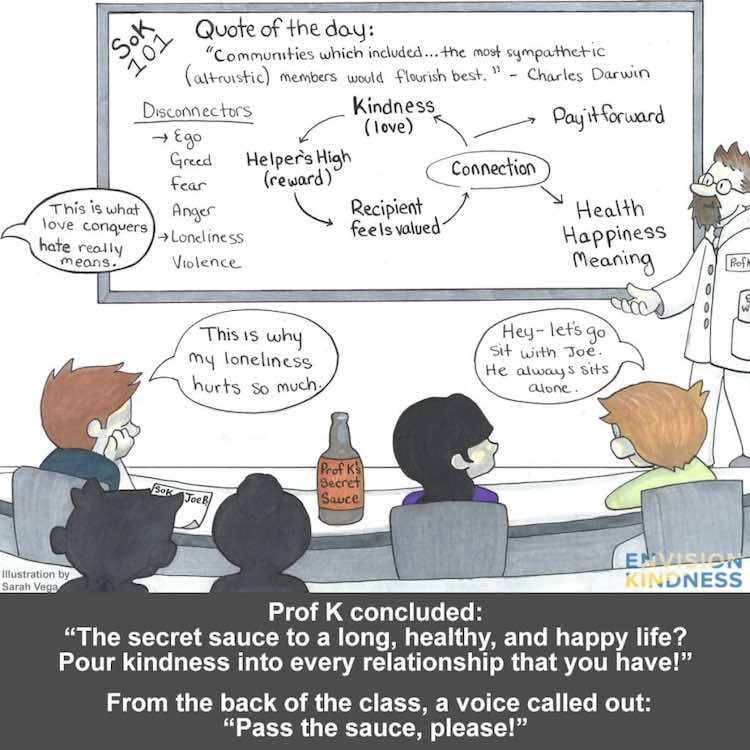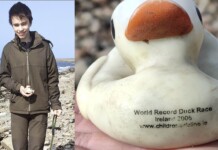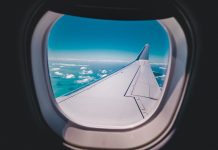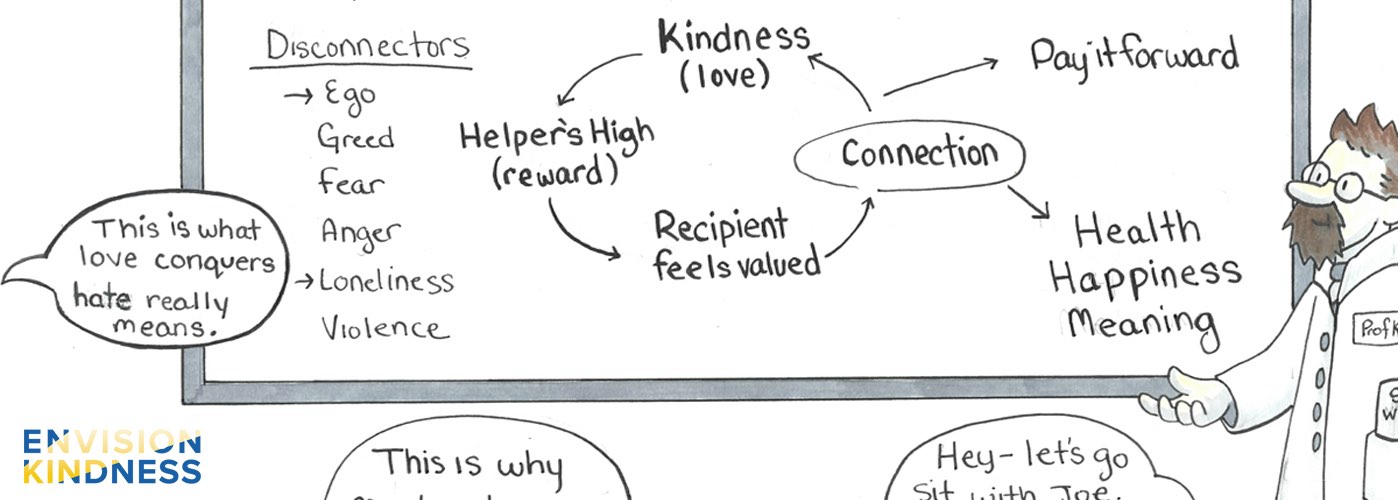As a means of continuing where we left off last month, this class is about how – in the face of adversity and negativity – we need to reconnect with one another more than ever before.

This installment of the Science of Kindness is reprinted with permission from Envision Kindness.
Reconnection is made possible by embracing kindness and compassion; embracing kindness and compassion happens once we realize that it is essential to our state of being and longevity. And it just feels good.
In case you can’t stay for the entirety of the class, here’s the “secret sauce” of this blog: when we truly understand that we are connected to one another, we give more freely, we treat each other with respect, we act with integrity, and we trust one another. As the socio-biologic need for kindness and connection is fulfilled, health, happiness, meaning, collaboration, and peace readily flow from there.
LOOK: 10 Best Stories When Kindness and Heroics Went Viral in 2018
Research already shows how satisfying our need for quality connections is absolutely critical for both mental and physical health. Adults who are socially isolated (lonely, without quality support group) have a risk of death that is 26% higher than those who have a quality social network, making it a formidable mortality factor that is comparable to health risks such as obesity, sedentary lifestyles, and smoking.
Heart disease is the major reason why lonelier people have higher mortality rates than those who maintain quality relationships (not social media relationships, either). This makes sense considering how loneliness is a potent psychological stressor that is also associated with higher blood pressure and blood sugar. People lacking quality social support also have understandably increased symptoms of anxiety and depression.
The need for connection is also seen in children, animals, and even insects. Given how widespread and strong the drive for connection is, the only logical conclusion is that the need to meaningfully connect with other living beings is baked into our biology. In fact, the area of the brain that is associated with the experience of social pain or loss is the same as the one that experiences physical pain, which partly explains why emotional loss is so painful and isolation in prison is such a powerful punishment.
MORE: Instead of ‘We Are What We Eat,’ the Science of Kindness Says ‘We Are What We See’ in Daily Life
Our need for one another may be an evolutionary adaptation to increase our chances of survival. Evolutionary biologists like Darwin have described how, in contrast to the concept of survival of the fittest (of an individual), members of a group must sacrifice for one another in order for the group to survive. Examples have been described throughout nature and across different species, such as bats, ants, and primates as well as humans. To sacrifice for, or GIVE to other people feeds that powerful, inborn drive to promote group survival.
Kindness and sacrifice, therefore, is the “default mode” of how almost everyone is born. When we give to someone else, especially for the sake of simply giving, we reconnect with our true nature AND we also send a signal to the recipient (and to ourselves) that we are connected.
Beyond spiritual or emotional terms, that signal can be described biologically. It is an internal signal in our brains that has been called the “helper’s high.” Scientists know that performing, thinking about, or simply witnessing acts of kindness activates the same parts of the brain responsible for reward (pleasure). It causes changes in our brain chemistry, including the release of endorphins (natural opiates in our bodies), dopamine, and serotonin. The latter two are both neuro-transmitters associated with feeling good. It is for these biological reasons that kindness can induce happiness: a natural, internal high or elevation. No other pharmacology needed.
RELATED: Exciting New Study Shows That Zapping the Brain ‘Acutely’ Relieves Symptoms of Depression
So how does kindness cause connection? On an obvious level, when someone gives of themselves to another person (even a smile or friendly hello), they are saying to that person “I see you—you are important and need to be recognized and/or supported.” Recognizing another person in a positive way makes the receiver feel valued, establishing a connection. And because nature has blessed the giver with internal reward mechanisms, the behavior can be reinforced as the giver’s biologic destiny has been momentarily fulfilled. Once we know that we are connected to one another in so many ways, kindness flows readily and becomes a virtuous, self-perpetuating cycle.
A major reason why people may feel like they are disconnected from their naturally compassionate tendencies is that the negative stories and images that are displayed on our social media feeds are very impactful—just like how our system is programmed to be kind, we are also programmed to identify threats and respond to them. Unrelenting negative images, stories, and experiences DISCONNECT us from each other—things like ego, fear, anger, and greed all make us think that we need to protect ourselves from other people.
Additionally, while people may appear connected through social media, these connections do not replace higher quality interpersonal relationships. In fact, as people spend more time on social media, they spend less time in interpersonal interactions. When people don’t feel connected to others, there is less kindness, tolerance, and collaboration. In contrast to the kindness-connection loop, this is a vicious and destructive cycle that perpetuates itself.
CHECK OUT: Next Time You’re Feeling Stressed or Anxious, This Study Says You Should Play Tetris
So how can we conquer this? We need to connect more meaningfully with others and show them kindness – even if it is in small, simple ways. For example, are there people at school or work who seem more alone or secluded? Instead of ignoring them or thinking they are anti-social, why not say “hello” and smile as we walk by; eat lunch with them, or recognize the good work that they do? Or maybe you can call a friend just to say hi and see how they’re doing? Visit the elderly; volunteer for a worthy cause. In this frame of thinking, we don’t let political or racial divisions rob us of the opportunities to work together.
Christian Picciolini, the former neo-Nazi who now helps white supremacists find their way back to mainstream society, bases his approach on how many neo-Nazis simply want to find compassion and a way to belong. Every soul, he says, needs identity, community and purpose – and all of these can come through meaningful connection. His recommendation? “Find someone who doesn’t deserve your compassion and give it to them because that’s what happened to me.”
So if you want to give yourself, your family, your community, and even strangers a significantly better 2019, try more kindness – and once you get better at recognizing how interconnected we are, you’ll quickly realize how easy it is to be compassionate.
Interested in learning more about the science of kindness and its role in your life? Visit EnvisionKindness.org to learn more.
Be Sure And Share The Secret Sauce Of Kindness With Your Friends On Social Media – Feature photo by Robert Anton Apparante / Envision Kindness




















